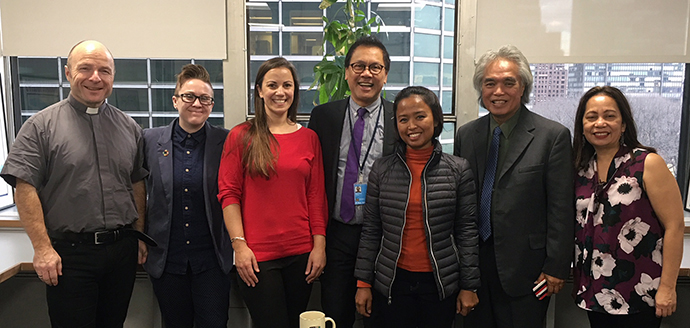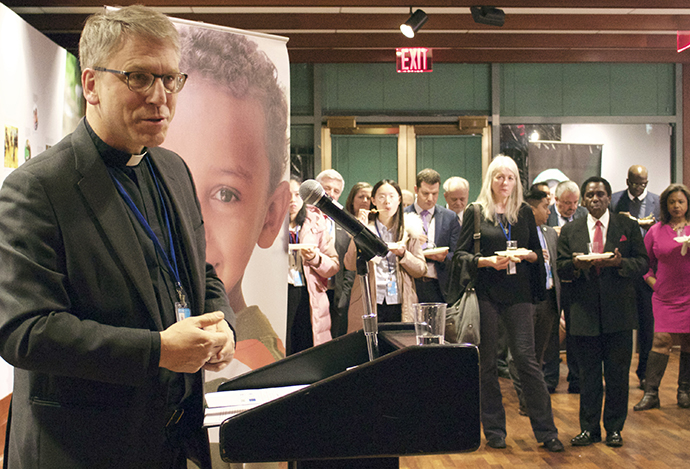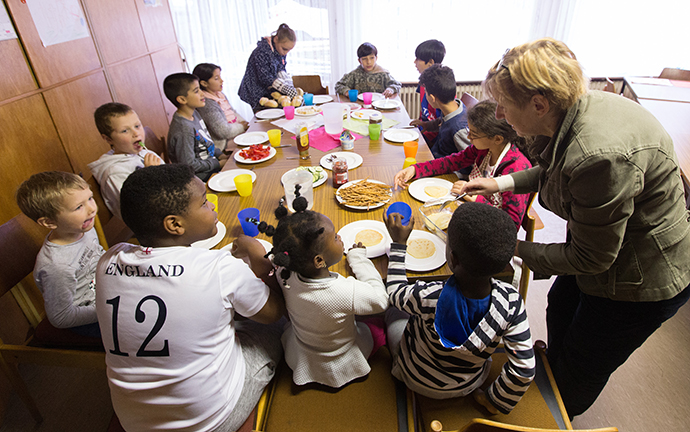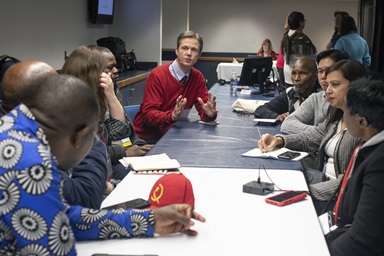The head of the United Nations recently called the world’s ability to deal with record levels of global migration a profound test of international cooperation — and religious leaders, including United Methodists, agree.
The contributions of faith-based organizations “are critical” for this test, said Ganoune Diop, leader of the International Religious Liberty Association, on Jan. 22, during the Fourth Annual Symposium on the Role of Religion and Faith-based Organizations in International Affairs.
“Migrants give us an opportunity to be humane and therefore human,” added Diop, who also serves as director of public affairs for the Seventh-Day Adventist Church. “We allow ourselves to do deeds of righteousness.”

Among those taking part in the Jan. 22 U.N. symposium on migration were, from left, the Rev. Hans Martin Hoyer of Germany; Quinn Wonderling, Rebecca Cole and the Rev. Liberato “Levi” Bautista, all staff with the United Methodist Board of Church and Society; Eni Lestari Andayani Adi, International Migrants Alliance; Leon Siu, foreign minister of the Kingdom of Hawaii and Connie Sorio, coordinator of migrant justice and (Asia-Pacific) partnership for KAIROS: Canadian Ecumenical Justice Initiatives. Photo courtesy of the Board of Church and Society.
For the Rev. Hans Martin Hoyer, a United Methodist pastor from Germany, this global issue is a local one.
Since the end of 2015, some 65 refugees — mostly from Iran and Afghanistan, with a few from Iraq — have come become involved with his congregation of 100 or so regular worshippers in Göppingen, near Stuttgart in southern Germany.
In joining other participants in a United Nations conference room for the symposium, Hoyer also was a model of how religious leaders are responding to a situation that has had a profound impact on both him and the church he leads.
“Our congregation has changed totally,” he told United Methodist News Service.
As the United Nations considers a “global compact” on human migration, “faith-based organizations are seeking not simply to assert the rights and dignity, but also to amplify the voices of uprooted people — regardless of their category or status,” stated a concept note for the symposium.
Children as migrants
“Every second person who is forcibly displaced today is a child,” said Verena Knaus, a senior policy advisor for UNICEF, during the Jan. 22 U.N. symposium. Often, she added, that displacement lasts an entire childhood.
No one state can handle the challenge of migration by itself nor is the protection of children the responsibility of one state or institution, Knaus said. “We need to get to the point where children are recognized as a priority in practice.”
While “it’s very easy to agree on children and adopt very nice-sounding statements,” the international community has to deliver with action, she added.
During a reception at UNICEF headquarters following the symposium, the Rev. Olav Fykse Tveit, top executive, World Council of Churches, noted that photos on the surrounding walls were reminders that children “are most affected” in some of the crises causing migration.
“Children help us to see more clearly the essential task to create hope for our human family, particularly for those who are migrants among us,” he said in his speech.
For the Rev. Liberato “Levi” Bautista, who heads the U.N. office of the United Methodist Board of Church and Society, “the concern of faith-based organizations is indeed about forced migration. While the global compact aims for safe, regular and orderly migration that is not really the problem.”
Bautista played a chief role in organizing the symposium, along with leadership from the World Council of Churches, the Seventh-Day Adventist Church and ACT Alliance, an ecumenical humanitarian organization. For the United Nations, the Office on Genocide Prevention and the Responsibility to Protect was a co-sponsor, on behalf of the U.N. Inter-Agency Task Force on Engagement with Faith-based Organizations.
Language is an important distinction when it comes to issues of displacement and marginalization or inclusion and justice, he pointed out.
“Migrants refer to the human and the humane,” Bautista told UMNS. “Migration refers to the management. That, to me, dehumanizes and moves away from the focus that is the harrowing experience of many migrants.”
In the symposium’s opening presentation, Amina J. Mohammed of Nigeria, deputy secretary-general of the United Nations, spoke of the challenges facing today’s world.
“Unfortunately, not since the Second World War have so many people fled their homes to seek a place of greater safety,” she said. “Some 66 million people, half of them children, have fled armed conflicts, persecution, poverty, climate change and natural disasters and are now refugees or displaced persons within their own countries.”
Faith-based organizations, Mohammed added, “are found on the frontiers of these crises, providing food, shelter, education, medical and psychological support.”
The Rev. Susan Henry-Crowe, Church and Society’s top executive, acknowledged the “vitally important” relationships across faith communities — including the ones represented at the symposium — that help the international community remember the human face of migration.
“Current realities are driven by fear and anxiety, often framed as issues of national security and detrimental to economic wellbeing,” Henry-Crowe pointed out. “For those of us who are people of faith, fear and anxiety are not responses which grow out of our faith traditions. Our faith traditions are about life and hope.”

Speaking at a reception hosted by UNICEF on 22 January, the Rev. Olav Fykse Tveit, top executive, World Council of Churches, offered an ecumenical vision on migration, inclusion and justice. Photo by Marcelo Schneider, courtesy of WCC.
The Rev. Olav Fykse Tveit, top executive, World Council of Churches, cited one of the hopeful solutions offered by faith groups — the effort to establish a “safe corridor” for those entering Europe through Italy.
Italian Methodists have been an integral part of Mediterranean Hope — a project of the Federation of Protestant Churches in Italy that has served hundreds of migrants — and participate in a broader ecumenical effort to work with the Italian government on the issuing of humanitarian visas for the most vulnerable.
"That has been one example of how we have to move to dealing with this crisis in a dignified way,” Tveit said.
Additional resources on migration
The United Methodist Church’s 2016 resolution: “Welcoming the Migrant to the U.S.”
Maintaining and restoring human dignity is a core goal of ACT Alliance, noted its top executive, Rudelmar Bueno de Faria.
“If we, as faith-based organizations, only see migrants as victims, then we undermine their strength and their resilience,” he added. The political role of faith-based organizations is to help the international community address migration by focusing on them as human beings, he said.
In Göppingen, Germany, Hoyer, the United Methodist pastor, believes his congregation — at what is called “Peace Church” in English — has benefited from this ministry. “The question is always how to open your doors wide for everybody,” he said.
He has good contacts with the town social board assisting the refugees. Leaders of the camps where refugees live “all know my number” and Hoyer has accompanied 20 asylum-seekers to interviews with the government.
A number of German churches are assisting refugees. With the support of Germany United Methodist Bishop Harald Rückert, representatives of 20 to 30 United Methodist congregations in southern Germany working with refugees met last week to form a network. They plan to share resources and experiences both among themselves and the German church in general, Hoyer said.
Migrants and refugees also want to speak for themselves, as two members of the event’s panel discussions made clear.

Volunteer Hannah Guzinski helps serve a meal to immigrant children in an art education enrichment program at the United Methodist Peace Church in Hamburg, Germany. A number of United Methodist congregations in Germany are assisting refugees. Photo by Mike DuBose, UMNS.
“We are the first people to be affected by any migration policy,” said Eni Lestari Andayani Adi, chairperson of the International Migrants Alliance, whose participation was supported by Church and Society. “Therefore, we must be in the frontline of any decision making.”
Sana Mustafa, a Syrian refugee with political asylum in the U.S. and a founding member of the Network for Refugee Voices, believes the world needs both their stories and their expertise. “The main challenge is to recognize and admit that we are important,” she said.
The simple choice for those accompanying migrants is that of hospitality, suggested the Rev. Lester Edwin Ruiz, advisor for Churches Witnessing with Migrants.
“We can create a wall to keep them out, or we can welcome them, offer them hospitality — which does not mean that we have to embrace them, only that we treat them as human beings, like ourselves,” he said.
Bloom is the assistant news editor for United Methodist News Service and is based in New York.
Follow her at https://twitter.com/umcscribe or contact her at 615-742-5470 or [email protected]. To read more United Methodist news, subscribe to the free Daily or Weekly Digests.
Like what you're reading? Support the ministry of UM News! Your support ensures the latest denominational news, dynamic stories and informative articles will continue to connect our global community. Make a tax-deductible donation at ResourceUMC.org/GiveUMCom.




